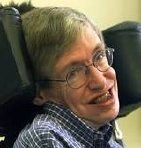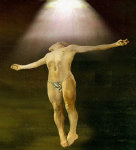1. Does the cosmos need a supernatural first cause?
In antiquity, when we believed the Earth was not
only the center of creation but the entire cosmos, this seemed obvious. Now we know we are not central to a vast and ancient
cosmos, and science has plausible Theories of Creation that do not require supernatural cause.
2. Is all around
us designed for a purpose?
While the Laws of Nature seem designed because everything works so well together,
we now know that the cosmos is a chaotic system built out of quantum probabilities ... and that it may be just one of many. Modern
science questions planful purpose.
5. Is goodness evidence of a planful, active God with benevolent intent?
Since science and philosophy posit
that neither the cosmos or consciousness require such a Creator, seeking proof of supernatural intent, we turn to other
sources. We ask, could goodness such as glory, miracles, and Holy Scripture exist without Him?
6. Can evil, manmade
or otherwise, be reconciled with a caring God?
However, if we argue for the above, then we have to explain
why evil abounds. In the absence of certainty, we are left with faith, but this does not mean that what we believe is true. In
the end, we can only assign a likelihood to our beliefs ... the God Number.
"Struggling to survive the Nine Threats, searching to understand Surroundings, Self, and Significance, sentience asks the Six Questions
of God. First we wish to know Who or What created the cosmos and conciousness. Then we want to know Why." ... Turen
"Religions rise and fall with the ebb and flow of Tribe and Empire. Eventually, spirituality must not only pass
the test of time but the scrutiny of science. The secret to reconcile revelation and reason lies in the Three
Awakenings of Being." ... Turen

SIX QUESTIONS
3. Does sentience require an active Creator?
To our forbears, thinking the Earth was not only central to the
cosmos but created for us alone, this too seemed obvious. Now, the Theory of Evolution, like those of creation, does not necessarily
require either a supernatural first cause or an active Hand in the unfolding of life.
4. Are
we too created for a supernatural purpose?
Religion (in the West at least) maintains that life
is meaningless without supernatural purpose. But humanist philosophy, supported by evolution, teaches that we can arrive at morality
and altruism thus giving our lives godly meaning without guidance from above.
The first two questions are of Surroundings: whether a planful Creator is required.
The next two questions are of Self: whether any possible God has active intent.
The last two questions are of Significance: can we know God's purpose and meaning.




